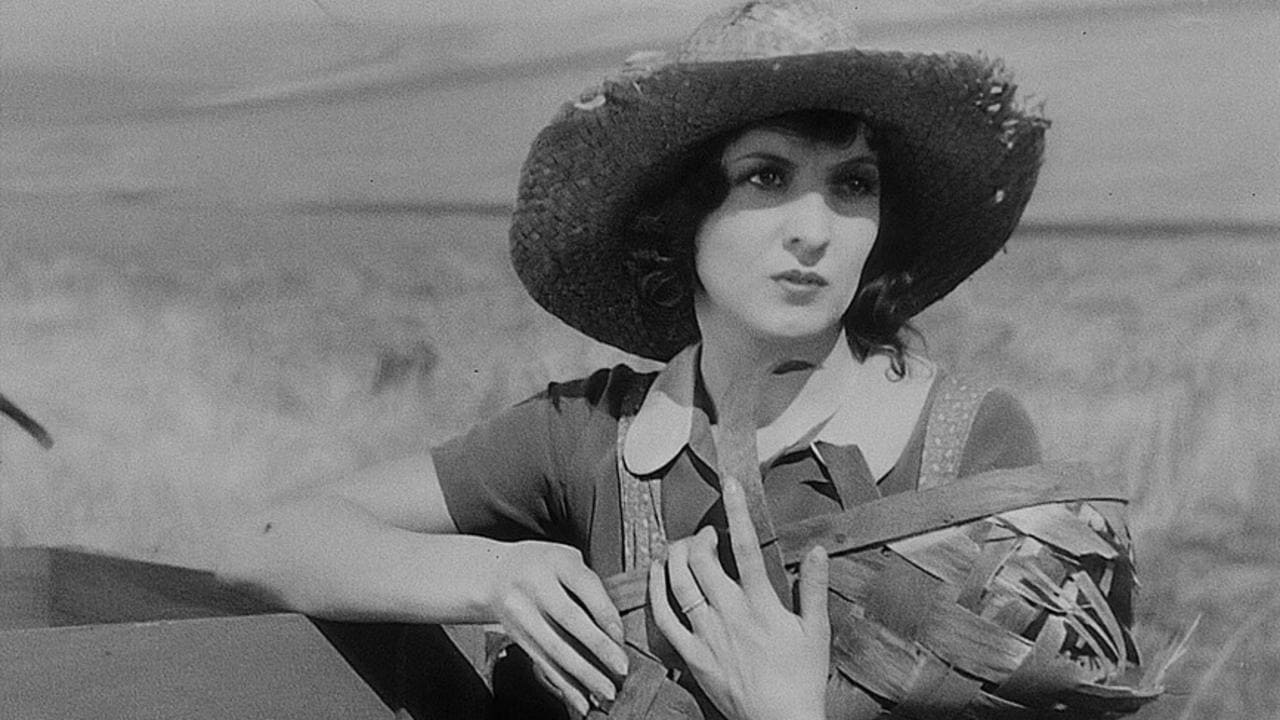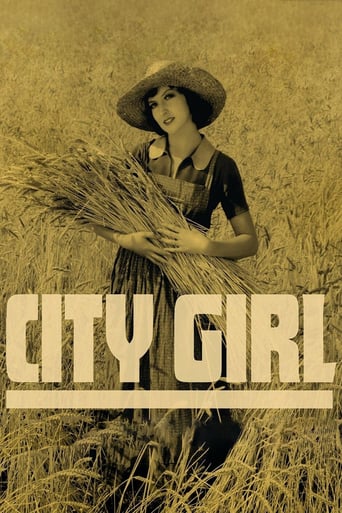

Being a fan of F.W Murnau's horror films, like 1922's Nosferatu & 1926's Faust. I found the movie to be a bit disappointing. Don't get me wrong, I love his films that picturization the harsh realities of life, such in the case of 1924's the Last Laugh, but this movie is just a nearly a mirror image of his previous well-made film, 1927's Sunrise. While, Sunrise had a complex story, that mixed melodrama, romantic and thriller, well. This movie sadly didn't live up to that. Based on the play "The Mud Turtle" by Elliott Lester. The movie tells the story of a young woman, Kate (Mary Duncan), a waitress in a busy Chicago lunchroom who lives a dreary city life. She dreams of escaping the depressing realism city terms and returning to the romanticism beliefs of the countryside. She sees Lem Tustine (Charles Farrell) as her way out. Lem is a naïve and sweet-natured farm boy who has been sent to the city to sell his family's wheat crop. Over the course of a few visits, they fall in love, marry, and set out for the wheat-fields. Kate find out first-hand, that country life isn't what she dreamt, it could be, as Lem's harsh, tyrannical father (David Torrence), run and work his farm-hands hard in a nearly fascist dictator state. Can Kate survive farm-life, or will she leave back for the city? All of the acting is pretty well-done. Due to the director inability to secure the services of Sunrise star Janet Gaynor. The director was forced by the studio to substitute for Mary Duncan. She was chosen reportedly because she was the girlfriend of one of the Fox executives. I was disappointed to read that Mary Duncan gave up the profession just a couple of years after this movie wrapped as she had real star quality. Charles Farrell had a longer lasting career, before going into politics. He end, being the mayor of Palm Springs for a while. Both leads deliver tremendous performances in City Girl. David Torrence plays the formidable father figure with great vigor and is terrifying. His constant scowl works to overshadow the central romance. Still, his character never made much sense in the reason, why he is angry. The whole ending turn seem unrealistic, and unexplained as hell. Richard Alexander as Mac, the quietly devious but charming, love interesting/rival was alright for the most part. One thing, that the film seem to missing was the German Expressionism. Everything, here seems to be made in the style of American filmmaking. Gone are the exaggerated, fairy-tale world city sets that made movies like Sunrise stand out. Everything here was indeed control by the lower budget due to the Great Depression. The city sets were nearly limited to two scenes in a small studio. One is the busy diner, where Murnau captures city life as a bustling and crowded, as every extra seems in a rush to get to one place or another without showing much of the city landscape. Two is the apartment that Kate lives. Her apartment looks out over flashing neon signs and an elevated railway just inches from her window is thrown in for good measure. I was really hoping for more than that. The country sequences are poorly lit with characters using oil lamps in order to navigate the house and fields at night. There were a few impressive tracking shots, but for the most part. It wasn't used due to the change in locations. F.W Murnau wanted it in Minnesota, but due to budget, it was filmed in Oregon. You truly don't see much of the landscape in this film. F.W Murnau always used forced perspective in most of his films, but in this film. It was indeed, missing. Director F.W. Murnau wanted the title of the film to be "Our Daily Bread", but the studio refused, as the title might offended Christians watching the film. City Girl went on somewhat call 'the Intruder' in French cinemas due to misunderstand in language of the plot as people thought it was a murder mystery like Sunrise. City Girl was made in a time, where silent films were falling out of fashion for 'talkies' movies. While, the film, which had been shot silent. The studio scheduled to have parts of it re-shot with sound. Murnau refused, wanting nothing to do with "talkies". Due to this and other clashes with the Fox studio, he left the picture before it was completed. An assistant director finished it. A version of the film, with some sound elements, was made alongside the silent version, but was lost over time. As of this writing, the silent version is the only copy of this film. So indeed, the final product perhaps was Murnau's vision and its shows. Since the movie is a public domain silent film. The score of the film differs by copy. Arthur Kay's original score might be missing in some of them. Depending on your copy, Christopher Caliendo might be yours. Its feature an upbeat, fast tempo but jolting score which captures the frenetic stop-start pace of city life and more apathetic pace for the country. It's the best version. The movie was indeed cut as there are 90 minutes versions, and 77 minute ones. For an old silent film, most of the copies are surprising well restored. There are a few dirt on the film, but for the most part, nice and clean. Look for the Masters of Cinema Blu-Ray version or 20th Century Fox - Region 1 for the best copies. Overall: City Girl a great example about love and the struggle between rural life and urbanization. It's a paradoxical retelling of the fable of the city rat versus rat fields.
... View MoreThis is it. I've so far thought of and approached Murnau more with sensible appreciation than passionate investment where I'm not only swept off my feet, but myself allow to be. "Nosferatu" (1922), "Der letzte Mann" (1924) and "Sunrise" (1927) exhibit his genius, but for some reason this works for me wholly differently. Perhaps I come to this from the right direction: "L'Atalante" (1934), "Coeur fidèle" (1923), "Der Blaue Engel" (1930), "Days of Heaven" (1978), and so on. It does feel like there has been something missing in its place, now domiciled, referred to by these films I love. Now I feel like I've always carried the film with me.You might know Murnau disliked intertitles, and I guess this would perfectly work without them, since I find the visual language even stronger and more lucid than in "Der letzte Mann", which, if you've seen that film, might be even frivolously arrogant an argument. But the way he constructs each scene to convey things visually, not only plot and "dialogue" but also atmosphere, is panoptic, personal yet fluent.The Blu-ray released by the Masters of Cinema (Region B) is shockingly wonderful in quality. I'm not partial to the Christopher Caliendo score. Someone somewhere (vague enough?) remarked how on occasion it seems like the score is competing with the image instead of complementing it and I paraphrase because there wouldn't be a better way to express how I feel about it. Indeed, I prefer seeing the film without sound – Murnau carries the film forward so eloquently, effortlessly through the image and editing that all emotion disseminates vividly. All of this is so masterful I wouldn't be too much out of my wits if I argued for this film to be among the very pinnacle of silent film – and any cinema for that matter.The scene where they first arrive together and run through the field might be the most exhilarating film moment ever.
... View MoreThis film came as a complete surprise. What a masterpiece!!! It may very well be Murnau's second best film (after Sunrise). It is extremely well made and the acting is superb. I can't for the life of me understand why this film is not better known. And why it has not got the DVD treatment it deserves.I bought my copy at ebay (from emoviez). The transfer is actually quite good, considering that this is a private seller. The music was how ever quite tiring and repetitive, most likely just put there to have something playing, for the ones that can't stand the silence.Murnau plays with some of the same motives as in Sunrise, but with a totally different approach. It is especially interesting to compare the City girl in Sunrise and the one in this film. I also wonder if he was not also dealing with his own past, but the father in the film really resembles what we know about Murnau's own father.A must see!!! 10/10
... View More'City Girl' is a tantalising glimpse of what sort of Hollywood career F.W. Murnau might have had, if not for his untimely death. In some ways, this film resembles Murnau's masterpiece 'Sunrise' told in reverse: here, a young couple fall in love in the city (Chicago), then travel to the countryside (Minnesota), where they bitterly separate, then reconcile.The two romantic leads are excellent. Charles Farrell gives possibly the best performance of his career here, easily surpassing his performances in similar roles directed by Frank Borzage. Mary Duncan is a revelation: why didn't she go on to a significant career? She shows herself here to be a talented actress as well as attractive in a believable way, without the artificial prettiness that so many Hollywood actresses of this time had. The scene in which Farrell and Duncan chase each other through the field of grain is delightfully erotic: a very convincing evocation of love mingled with sexual attraction.Murnau was a master at directing crowd scenes. I was deeply impressed by two scenes in this film: one in a crowded railway car, the other in a crowded restaurant. In both scenes, the people in the background are doing exactly what they would be doing if this were real life. (Two children are running up the corridor of the train.) Compare this with so many other Hollywood films, in which the background extras are obviously frustrated actors trying to call attention to themselves. I was amused to spot Murnau doing a Hitchcock-like cameo as a customer in the restaurant. Much less convincing is a scene depicting a crowded Chicago street. Although the very complicated set for this scene is technically impressive, it's clearly a constructed set on an indoor soundstage, not an actual exterior. Also, I was displeased to see in 'City Girl' not one but two examples of that dire movie cliché, in which a character opens a newspaper and conveniently sees a headline that relates directly to his own personal situation.There is a very impressive sequence depicting the Chicago grain exchange, and also a clever visual transition from the countryside to the city: we see farmer David Torrence slicing a loaf of bread (aiming the large knife directly at his own chest), followed by a cut to a waitress in the restaurant operating an automatic bread-slicing machine, which was a high-tech gizmo back in 1930. All of the characters in 'City Girl' are plausible and well-acted. I'll rate this movie 9 out of 10. Herr Murnau, if only you hadn't taken that auto trip...
... View More